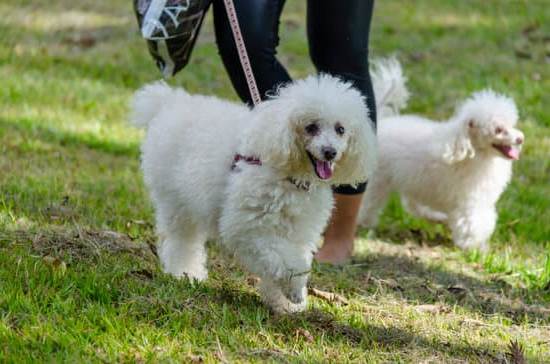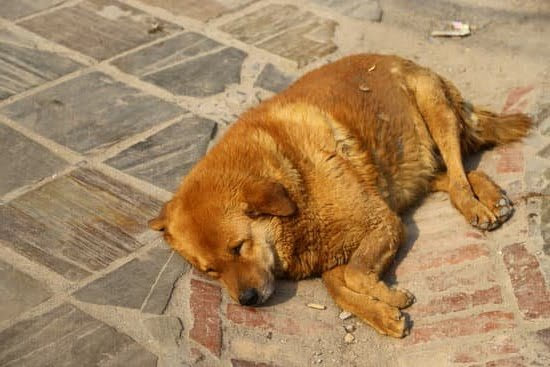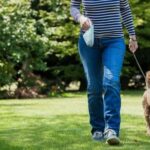Are you wondering how to potty train an old dog? Potty training an older dog comes with its own set of challenges, but with patience and perseverance, it can be achieved. As dogs age, they may develop new behavioral patterns or may experience health issues that can lead to accidents indoors. In this article, we will discuss the different strategies and techniques to effectively potty train an old dog.
Potty training an older dog can be difficult due to various factors such as medical conditions, changes in routine, or simply ingrained habits. Understanding the challenges of potty training an old dog is crucial in order to develop a successful training plan. By assessing the situation and determining the root cause of your dog’s accidents, you can better tailor your approach to address the specific needs of your older canine companion.
Establishing a routine is key when it comes to potty training an old dog. Consistency is essential for them to understand where and when they should do their business. Additionally, using positive reinforcement through rewards and encouragement can aid in the training process and motivate your older dog to learn new habits. With patience, perseverance, and dedication, you can successfully potty train an old dog and celebrate progress along the way.
Assessing the Situation
When it comes to potty training an old dog, one of the first steps is to assess the situation and determine the root cause of your dog’s accidents. Understanding why your dog is having accidents in the house is crucial in developing an effective potty training plan.
There are several potential reasons why an older dog may be having accidents indoors. It could be due to a medical issue such as incontinence or a urinary tract infection. It could also be related to anxiety, stress, or discomfort. In some cases, it may simply be that your dog was never properly or fully housetrained.
To assess the situation, it’s important to observe your dog’s behavior and look for patterns. Keep track of when and where accidents occur, as well as any accompanying behaviors such as pacing, whining, or excessive drinking. Additionally, consulting with a veterinarian can help rule out any underlying medical issues that may be contributing to your dog’s accidents.
Once you have a better understanding of why your old dog is having accidents, you can tailor your potty training approach to address the specific issue at hand. Whether it’s implementing a stricter routine, addressing anxiety triggers, or seeking medical treatment, identifying the root cause is essential in successfully potty training an old dog.
Establishing a Routine
- Set a regular feeding schedule: By feeding your dog at the same times every day, you can better predict when they will need to go outside to relieve themselves. This helps in minimizing accidents indoors and also allows you to closely monitor their bathroom habits.
- Designated potty breaks: Take your dog outside for bathroom breaks at regular intervals throughout the day, such as first thing in the morning, after meals, and before bedtime. Giving them ample opportunities to go outside will minimize accidents inside the house.
- Use consistent cues: Pick a specific word or phrase that you consistently use when encouraging your dog to go outside for bathroom breaks. This helps in reinforcing the connection between the cue and the desired behavior.
- Create a designated bathroom area: Choose a specific spot in your yard where you want your dog to go potty, and consistently take them there each time. The familiar scent of previous visits can encourage them to do their business in that location.
By establishing a routine with these steps, you can provide your old dog with clear expectations and guidance on where and when they should go potty. Consistency is key when it comes to how to potty train an old dog, so be patient and stick with the routine until they fully grasp the concept.
Positive Reinforcement
When it comes to potty training an old dog, positive reinforcement can be a powerful tool in aiding the training process. Positive reinforcement involves rewarding your dog for exhibiting the desired behavior, in this case, going potty outside. This can be achieved through treats, verbal praise, or even playtime. The key is to make the experience of going potty outside a positive and rewarding one for your older canine companion.
One effective method of positive reinforcement is using a marker word or phrase such as “good job” or “well done” when your dog successfully goes potty outside. Pairing this with a small treat or extra belly rubs can reinforce the idea that going potty in the designated area is a behavior that you approve of. Over time, your old dog will come to associate going potty outside with receiving praise and rewards, making them more likely to continue this behavior.
Furthermore, it’s important to remember that every dog is different and may respond best to different types of rewards. Some dogs may be highly food-motivated and will work hard for a tasty treat, while others may prefer praise and affection as their reward. Understanding what motivates your old dog will help you tailor your positive reinforcement techniques to their individual needs.
| Reward Type | Description |
|---|---|
| Treats | Small, bite-sized treats that your dog enjoys |
| Verbal Praise | Using encouraging words such as “good boy/girl” or “well done” |
| Playtime | Allowing your dog some extra playtime as a reward for going potty outside |
By incorporating these rewards into the potty training process, you are not only reinforcing positive behavior but also strengthening the bond between you and your older dog.
Supervision and Management
Potty training an old dog can be a challenging task, but with the right approach and strategies, it is definitely achievable. One of the key components in successfully potty training an old dog is through supervision and management. By closely monitoring your dog’s behavior and taking proactive steps to prevent accidents, you can effectively guide them towards successful potty training.
Here are some tips for effective supervision and management in potty training an old dog:
- Establish a routine: Set specific times for bathroom breaks and stick to a consistent schedule. This will help reduce the chances of accidents occurring inside the house.
- Use confinement: When you’re unable to actively supervise your dog, consider confining them to a designated area such as a crate or a small room. This will limit their opportunities to have accidents indoors.
- Keep an eye on their body language: Pay attention to signs that indicate your dog needs to go outside, such as sniffing around or circling. By being observant of their behavior, you can intervene before accidents happen.
By implementing these strategies for supervision and management, you can greatly reduce the likelihood of accidents occurring while potty training your old dog. Remember that consistency is key in this process, so be patient and persistent in your efforts.
With dedication and commitment, you can successfully potty train an old dog and celebrate progress as they learn to adapt to new bathroom habits.
Cleaning Up
Old dogs can sometimes have accidents inside the house, which can be frustrating for pet owners. However, it’s important to understand that this behavior is not uncommon and can often be addressed with proper training and patience. One of the key steps in addressing this issue is learning how to clean up accidents effectively to avoid repeated offenses.
When it comes to cleaning up after an accident, it’s crucial to act quickly. The longer a mess sits, the more likely it is that your dog will continue to use that spot as a bathroom. Use paper towels or old cloths to soak up as much of the urine as possible.
Then, apply an enzymatic cleaner specifically designed for pet messes to thoroughly clean the affected area. This type of cleaner breaks down the organic compounds in urine and eliminates the odor, which can help prevent your dog from returning to that spot.
In addition to using enzymatic cleaners, it’s also important to regularly clean any areas where your dog has had accidents with a disinfectant. Dogs have a strong sense of smell and are drawn back to places where they have previously eliminated, so using a disinfectant can help remove any lingering scents that might attract them back to the same spot.
It’s also essential to keep an eye on your dog and try to identify any patterns in their bathroom behavior. If you notice that your dog consistently has accidents at certain times of day or in specific locations within the house, this information can be valuable in developing a strategy for successful potty training. By closely monitoring their behavior and implementing these cleaning tips, you’ll be taking proactive steps towards preventing repeated accidents.
| Steps for Effective Cleaning | Description |
|---|---|
| Act Quickly | Soak up urine with paper towels and apply enzymatic cleaner right away. |
| Use Enzymatic Cleaner | This type of cleaner breaks down organic compounds in urine and eliminates odor. |
Seeking Professional Help
Potty training an old dog can be a challenging task, especially if the dog has developed bad habits over the years. However, with the right approach and patience, it is possible to successfully train an older dog to go potty in the appropriate place. In some cases, seeking professional help from a trainer or behavioral specialist may be necessary to address underlying issues and facilitate the training process.
Recognizing Persistent Challenges
If you have been consistent in your training efforts but continue to struggle with your older dog’s potty habits, it may be time to consider seeking professional help. Persistent accidents in the house, signs of anxiety or fear related to potty training, or other concerning behaviors may indicate that there are underlying issues that need to be addressed by a professional.
Consulting With a Trainer or Behavioral Specialist
A qualified dog trainer or behavioral specialist can provide valuable insight and guidance when it comes to potty training an older dog. They can assess the specific needs and challenges of your dog, develop a customized training plan, and provide ongoing support and guidance throughout the process. Additionally, they can offer advice on managing any underlying medical conditions that may be contributing to your dog’s potty problems.
When Professional Help Is Necessary
Ultimately, if you feel overwhelmed or frustrated by your old dog’s potty training issues, seeking professional help is a valid and responsible decision. A trainer or behavioral specialist can offer expertise and resources that you may not have access to on your own.
With their assistance, you can work towards effectively addressing your dog’s potty training challenges and achieving success in changing their behavior for the better. Remember that every dog is unique, so what works for one may not work for another – professional help offers personalized strategies tailored specifically for your furry friend.
Overall, seeking professional help is not a sign of failure as a pet owner; rather, it demonstrates dedication and commitment to helping your old dog learn new habits and lead a happier, healthier life.
Patience and Perseverance
Potty training an old dog can be a challenging and long process, but with patience and perseverance, it is definitely achievable. Understanding that it takes time and dedication is crucial in successfully potty training your older canine companion. Here are some tips to help you navigate through this process.
Consistency Is Key
One of the most important aspects of potty training an old dog is consistency. Establishing a routine and sticking to it will help your dog understand when and where they should do their business. Take them out at the same times every day, especially after meals, playtime, and naps. This predictability will help them recognize when it’s time to relieve themselves.
Positive Reinforcement
Using rewards and encouragement is also vital in the potty training process. When your old dog successfully goes potty outside, praise them and give them a treat. This positive reinforcement will encourage them to continue going outside instead of indoors.
Managing Accidents
It’s important to remember that accidents will happen during the potty training process. Instead of scolding or punishing your dog for accidents, focus on preventing future accidents by closely monitoring their behavior and taking them outside regularly. Clean up accidents promptly with pet-specific cleaners to eliminate odors that may attract your dog back to the same spot.
By maintaining consistency, using positive reinforcement, and managing accidents in a gentle manner, you can successfully potty train an old dog with patience and perseverance.
Conclusion
In conclusion, potty training an old dog can be a challenging but ultimately rewarding experience. It is essential to approach the process with patience and perseverance, knowing that it may take time for your dog to fully grasp the new routine. By following the steps outlined in this article and consistently implementing positive reinforcement, supervision, and proper cleaning techniques, you can make significant progress in potty training your old dog.
It is important to remember that every dog is unique, and what works for one may not work for another. Be open to seeking professional help if you feel stuck or overwhelmed. A trainer or behavioral specialist can provide personalized guidance and support to address any specific issues or obstacles you may encounter in the training process.
In the end, celebrating even small victories and progress is crucial. Remember to praise and reward your old dog for their efforts, as this will encourage them to continue improving. With dedication and a positive mindset, you can successfully potty train an old dog and strengthen the bond between you and your furry companion.
Frequently Asked Questions
Can an Older Dog Still Be Potty Trained?
Yes, older dogs can still be potty trained, although it may take more time and patience compared to training a young puppy. Consistency, positive reinforcement, and a regular bathroom schedule are key factors in successfully potty training an older dog.
What Age Is Too Late to Potty Train a Dog?
There isn’t a specific age that is considered “too late” to potty train a dog. While it may be more challenging to train an older dog compared to a puppy, it’s still possible with the right approach and consistency. Older dogs can learn new behaviors with patience and positive reinforcement.
How Do You Train an Older Dog Not to Pee and Poop in the House?
To train an older dog not to pee and poop in the house, start by establishing a consistent bathroom schedule and taking them outside frequently. Use positive reinforcement when they eliminate outside, and clean up accidents inside without punishing the dog.
Consider crate training or using baby gates to limit access to certain areas of the house. Additionally, addressing any underlying medical issues or behavioral problems is essential in preventing accidents indoors.

Welcome to the blog! I am a professional dog trainer and have been working with dogs for many years. In this blog, I will be discussing various topics related to dog training, including tips, tricks, and advice. I hope you find this information helpful and informative. Thanks for reading!





